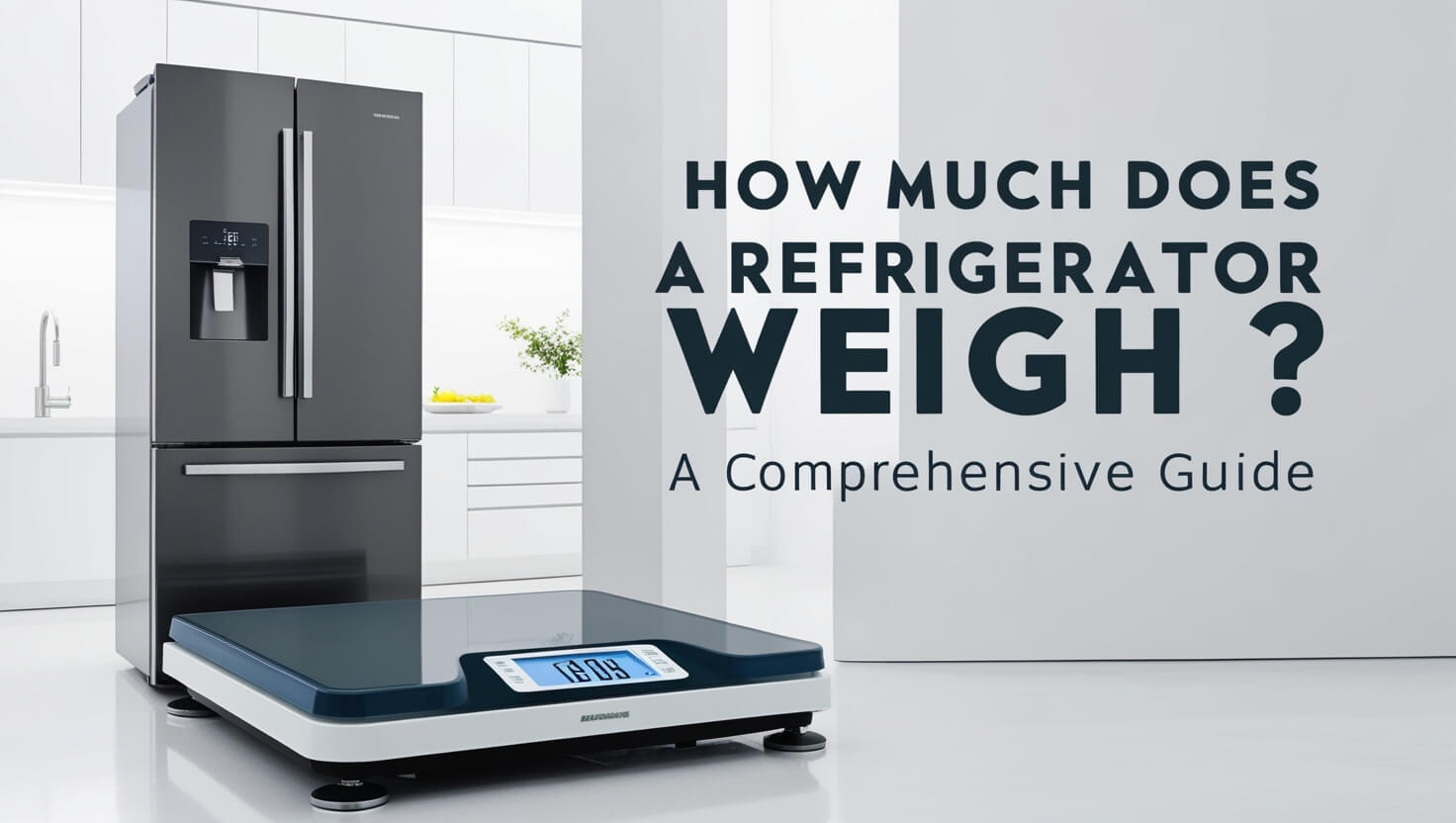How Much Does a Refrigerator Weigh?

Refrigerators are essential appliances in our homes, but have you ever wondered how much they actually weigh? The weight of a refrigerator can vary significantly, typically ranging from 100 to 400 pounds. Factors like size, type, and features all play a role in determining a fridge’s weight. Understanding refrigerator weight is crucial for installation, moving, and even energy efficiency. In this guide, we’ll explore everything you need to know about refrigerator weights.
Average Weights of Different Refrigerator Types
Refrigerators come in various shapes and sizes, each with its own weight range. Let’s break down the average weights for different types of refrigerators.
Full-Size Refrigerator Weights
Full-size refrigerators are the workhorses of most kitchens. These appliances typically weigh between 200 and 300 pounds. However, larger models with advanced features can tip the scales at over 350 pounds. The weight often correlates with the refrigerator’s capacity, with a general rule of thumb being about 12 pounds per cubic foot of interior space.
Side-by-Side Refrigerator Weights
Side-by-side refrigerators, known for their split design with the freezer on one side and the fridge on the other, usually weigh between 250 and 350 pounds. Some models with extra features like ice makers and water dispensers can weigh up to 400 pounds. These refrigerators tend to be heavier due to their larger size and additional components.
French Door Refrigerator Weights
French door refrigerators have become increasingly popular in recent years. These models typically weigh between 250 and 450 pounds. The weight can vary significantly based on the number of doors, drawer configurations, and extra features. Some high-end French door refrigerators with built-in water dispensers, ice makers, and smart technology can weigh over 400 pounds.
Top Freezer Refrigerator Weights
Top freezer refrigerators are a classic design and tend to be lighter than their more modern counterparts. These models usually weigh between 150 and 250 pounds. Their simpler design and fewer features contribute to their lower weight, making them easier to move and install.
Bottom Freezer Refrigerator Weights
Bottom freezer refrigerators typically weigh between 200 and 300 pounds. This design puts the most frequently accessed compartment at eye level, which can add some weight compared to top freezer models. The drawer-style freezer mechanism also contributes to the overall weight.
Mini Fridge and Compact Refrigerator Weights
Mini fridges and compact refrigerators are the lightweights of the refrigerator world. These small appliances generally weigh between 30 and 100 pounds. Dorm-sized mini fridges often weigh around 50 pounds, while slightly larger compact models with separate freezer compartments can weigh up to 80 pounds.
Factors Affecting Refrigerator Weight
Several factors contribute to a refrigerator’s weight. Understanding these can help you make an informed decision when choosing a new fridge.
Size and Capacity
The most obvious factor affecting a refrigerator’s weight is its size and capacity. Larger refrigerators with more interior space naturally weigh more. As mentioned earlier, a rough estimate is about 12 pounds per cubic foot of capacity. However, this can vary based on other factors.
Materials Used in Construction
The materials used to build a refrigerator significantly impact its weight. Stainless steel exteriors, while popular for their durability and appearance, add more weight compared to plastic exteriors. Similarly, glass shelves are heavier than wire racks. High-end models often use premium materials that can increase the overall weight.
Additional Features and Technologies
Modern refrigerators come with a host of features that can add to their weight. Ice makers, water dispensers, and built-in filters all contribute additional pounds. Smart refrigerators with touchscreens and advanced electronics can weigh even more. Each feature adds components that increase the appliance’s overall mass.
Age and Manufacturing Era
The age of a refrigerator can also influence its weight. Older models from the 1980s and earlier tend to be heavier than their modern counterparts of similar size. This is due to advancements in manufacturing techniques and materials. However, newer refrigerators with advanced features may still outweigh older, simpler models.
Commercial and Industrial Refrigerator Weights
Commercial and industrial refrigerators are in a league of their own when it comes to weight. These heavy-duty appliances are designed for high-volume use and often weigh significantly more than residential models.
Built-in Refrigerator Weights
Built-in refrigerators, designed to blend seamlessly with kitchen cabinetry, typically weigh between 300 and 600 pounds. Their weight is often higher due to their robust construction and the need for precise fitting within kitchen spaces. Some high-end built-in models can even exceed 700 pounds.
Commercial Display Refrigerator Weights
Commercial display refrigerators, like those found in supermarkets and convenience stores, can weigh over 500 pounds. These units are designed to withstand frequent door openings and constant use, requiring sturdy construction that adds to their weight.
Industrial and Restaurant Refrigerator Weights
Industrial refrigerators used in restaurants, hotels, and food processing facilities are the heavyweights of the refrigeration world. These units can weigh over 1000 pounds, with some large walk-in coolers exceeding several tons. Their massive size and heavy-duty components contribute to their substantial weight.
Luxury and High-End Refrigerator Weights
Luxury and high-end refrigerators often push the boundaries of both features and weight. These premium appliances can be significantly heavier than standard models.
Smart Refrigerator Weights
Smart refrigerators, equipped with touchscreens, cameras, and internet connectivity, typically weigh between 250 and 400 pounds. The additional technology and components in these models contribute to their increased weight. Some advanced smart refrigerators with large displays and multiple cameras can weigh up to 500 pounds.
High-End Brand Refrigerator Weights
High-end refrigerator brands often produce models that weigh more than average. These premium appliances can weigh between 300 and 700 pounds, depending on their size and features. The use of high-quality materials, advanced cooling systems, and luxury finishes all contribute to their increased weight.
Custom-Built Refrigerator Weights
Custom-built refrigerators, designed to fit specific spaces or meet unique requirements, can vary greatly in weight. These bespoke appliances can weigh anywhere from 300 to over 1000 pounds, depending on their size, materials, and features. The sky’s the limit when it comes to custom refrigeration, and the weight often reflects the level of customization.
How Refrigerator Weight Impacts Installation and Use
The weight of a refrigerator is more than just a number – it can have significant impacts on installation, use, and even your home’s structure.
Floor Load Considerations
One of the most important considerations when it comes to refrigerator weight is floor load capacity. Most standard floors in modern homes can support the weight of a typical refrigerator. However, if you’re installing a particularly heavy model or placing the refrigerator on an upper floor, it’s crucial to ensure the floor can bear the weight.
For example, a 400-pound refrigerator concentrated on four small feet can exert significant pressure on a specific area of your floor. This is especially important in older homes or those with wooden floors. If you’re unsure, it’s best to consult with a structural engineer or experienced contractor.
Doorway and Hallway Clearance
The weight of a refrigerator directly affects how easily it can be moved through your home. Heavy refrigerators require more manpower and often specialized equipment to navigate through doorways and hallways. When purchasing a new refrigerator, it’s essential to measure not just the space where it will be installed, but also all the paths it needs to travel to get there.
Remember, it’s not just about whether the refrigerator will fit through the doorway – it’s also about whether you can safely maneuver a heavy appliance through tight spaces. This is particularly important in apartments or homes with narrow hallways or staircases.
Energy Efficiency and Weight Correlation
Interestingly, there’s often a correlation between a refrigerator’s weight and its energy efficiency. Heavier refrigerators tend to have better insulation and more robust cooling systems, which can contribute to improved energy efficiency. However, this isn’t a hard and fast rule, as many lightweight, modern refrigerators are designed with advanced materials that provide excellent insulation without adding excess weight.
When shopping for a new refrigerator, don’t assume that a heavier model is automatically more energy-efficient. Instead, look for Energy Star certification and compare the annual energy usage of different models to make an informed decision.
Tips for Moving Heavy Refrigerators
Moving a heavy refrigerator can be a challenging task. Here are some tips to help you move your fridge safely and efficiently.
Proper Lifting Techniques
When lifting a refrigerator, proper technique is crucial to avoid injury. Here are some key points to remember:
- Never lift with your back. Instead, bend your knees and lift with your leg muscles.
- Keep the refrigerator close to your body as you lift.
- Avoid twisting your body while holding the refrigerator. Instead, take small steps to turn.
- If the refrigerator feels too heavy, stop immediately and seek help.
Remember, most full-size refrigerators are too heavy for one person to move safely. Always work with at least one partner when moving a refrigerator.
Using Appliance Dollies and Sliders
Appliance dollies are invaluable tools when moving heavy refrigerators. These specialized dollies have straps to secure the appliance and are designed to handle heavy loads. Here’s how to use one:
- Secure the refrigerator to the dolly with straps.
- Tilt the dolly back slightly, so the weight is balanced on the wheels.
- Move slowly and carefully, especially on uneven surfaces or steps.
For moving the refrigerator short distances on smooth floors, appliance sliders can be very useful. These are placed under the refrigerator’s feet, allowing you to slide the appliance more easily.
When to Hire Professional Movers
While it’s possible to move many refrigerators yourself with the right equipment and help, there are times when it’s best to hire professionals:
- If the refrigerator is particularly heavy (over 300 pounds)
- If you need to navigate stairs or tight corners
- If you have any physical limitations or health concerns
- If you’re moving long distances
Professional movers have the experience and equipment to move heavy appliances safely and efficiently. They can also provide insurance for your peace of mind.
Finding Your Specific Refrigerator’s Weight
Knowing the exact weight of your refrigerator can be crucial for moving, installation, or even selling purposes. Here are several ways to find out how much your specific refrigerator weighs.
Checking Manufacturer Specifications
The most straightforward way to find your refrigerator’s weight is to check the manufacturer’s specifications. This information is often available in:
- The user manual that came with your refrigerator
- The manufacturer’s website (you’ll need your model number)
- The product listing if you’re shopping for a new refrigerator
Manufacturer specifications usually provide the most accurate weight information, as they account for all components of the refrigerator.
Using Online Resources
If you can’t find your user manual and the manufacturer’s website isn’t helpful, there are other online resources you can use:
- Appliance retailer websites often list product weights
- Home improvement forums where other owners might have shared weight information
- Consumer review sites that compile product specifications
When using these resources, make sure you’re looking at the exact model of your refrigerator, as weights can vary significantly even within the same brand.
Weighing Your Refrigerator at Home
If all else fails, you can weigh your refrigerator at home, though this method is more challenging:
- Use a bathroom scale for mini fridges or very small refrigerators
- For larger refrigerators, you can use multiple bathroom scales (one under each foot) and add up the readings
- Another option is to use a cargo scale, which can handle heavier weights
Remember to empty the refrigerator completely before weighing it to get an accurate measurement of the appliance itself.
Future Trends in Refrigerator Weight
As technology advances and consumer preferences evolve, we’re seeing interesting trends in refrigerator weight. Let’s explore what the future might hold.
Lightweight Materials in Modern Refrigerators
Manufacturers are constantly researching and developing new materials to make refrigerators lighter without compromising on durability or insulation. Some emerging trends include:
- Carbon fiber components: Extremely strong yet lightweight
- Advanced plastics: Durable and lightweight alternatives to metal
- Aerogel insulation: Highly effective insulation that weighs very little
These materials could significantly reduce the weight of future refrigerators, making them easier to move and install.
Impact of Energy Efficiency on Weight
As energy efficiency becomes increasingly important, we’re seeing two opposing trends:
- Better insulation often means thicker walls, which can increase weight
- More efficient cooling systems may require less robust components, potentially reducing weight
The challenge for manufacturers is to balance these factors to create refrigerators that are both energy-efficient and manageable in terms of weight.
Balancing Features and Weight in Future Models
Consumer demand for advanced features shows no signs of slowing down. Future refrigerators may include:
- More sophisticated smart technology
- Built-in touchscreens and cameras
- Advanced food preservation systems
While these features can add weight, manufacturers are working on ways to integrate them without significantly increasing the overall mass of the refrigerator. We may see more modular designs, where heavy components can be easily removed for moving and reinstalled later.
The Bottom Lines
Understanding how much a refrigerator weighs is more than just trivia – it’s an important factor in purchasing, installing, and moving these essential appliances. From compact mini fridges weighing as little as 30 pounds to commercial behemoths tipping the scales at over 1000 pounds, refrigerator weights span a wide range.
Key points to remember:
- The average full-size refrigerator weighs between 200 and 300 pounds
- Larger, feature-rich models can weigh over 400 pounds
- Factors like size, materials, and features all contribute to a refrigerator’s weight
- Commercial and luxury refrigerators tend to be the heaviest
- Consider weight when planning installation, especially for floor load and moving logistics
- Future trends may lead to lighter refrigerators, but this will need to be balanced with energy efficiency and advanced features
When choosing a new refrigerator, consider not just its features and capacity, but also its weight. Think about how it will be delivered and installed, and whether your home can accommodate its size and weight. By taking all these factors into account, you can ensure that your new refrigerator is not only functional and efficient but also practical for your specific situation.
Remember, if you’re ever in doubt about moving or installing a heavy refrigerator, it’s always best to consult with professionals. They have the experience and equipment to handle these weighty appliances safely and efficiently.
As refrigerator technology continues to evolve, we may see significant changes in how much these appliances weigh. But for now, understanding refrigerator weights can help you make informed decisions and ensure that your cool companion is a perfect fit for your home.






